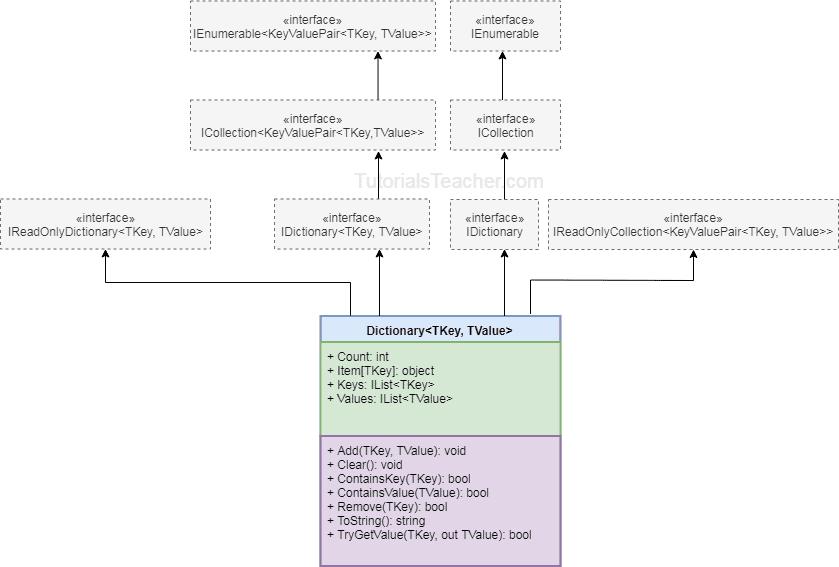C# - Dictionary<TKey, TValue>
The Dictionary<TKey, TValue> is a generic collection that stores key-value pairs in no particular order.
Dictionary Characteristics
Dictionary<TKey, TValue>stores key-value pairs.- Comes under
System.Collections.Genericnamespace. - Implements IDictionary<TKey, TValue> interface.
- Keys must be unique and cannot be null.
- Values can be null or duplicate.
- Values can be accessed by passing associated key in the indexer e.g.
myDictionary[key] - Elements are stored as KeyValuePair<TKey, TValue> objects.
Creating a Dictionary
You can create the Dictionary<TKey, TValue> object by passing the type of keys and values it can store. The following example shows how to create a dictionary and add key-value pairs.
IDictionary<int, string> numberNames = new Dictionary<int, string>();
numberNames.Add(1,"One"); //adding a key/value using the Add() method
numberNames.Add(2,"Two");
numberNames.Add(3,"Three");
//The following throws run-time exception: key already added.
//numberNames.Add(3, "Three");
foreach(KeyValuePair<int, string> kvp in numberNames)
Console.WriteLine("Key: {0}, Value: {1}", kvp.Key, kvp.Value);
//creating a dictionary using collection-initializer syntax
var cities = new Dictionary<string, string>(){
{"UK", "London, Manchester, Birmingham"},
{"USA", "Chicago, New York, Washington"},
{"India", "Mumbai, New Delhi, Pune"}
};
foreach(var kvp in cities)
Console.WriteLine("Key: {0}, Value: {1}", kvp.Key, kvp.Value);In the above example, numberNames is a Dictionary<int, string> type dictionary, so it can store int keys and string values. In the same way, cities is a Dictionary<string, string> type dictionary, so it can store string keys and string values. Dictionary cannot include duplicate or null keys, whereas values can be duplicated or null. Keys must be unique otherwise, it will throw a runtime exception.
Access Dictionary Elements
The Dictionary can be accessed using indexer. Specify a key to get the associated value. You can also use the ElementAt() method to get a KeyValuePair from the specified index.
var cities = new Dictionary<string, string>(){
{"UK", "London, Manchester, Birmingham"},
{"USA", "Chicago, New York, Washington"},
{"India", "Mumbai, New Delhi, Pune"}
};
Console.WriteLine(cities["UK"]); //prints value of UK key
Console.WriteLine(cities["USA"]);//prints value of USA key
//Console.WriteLine(cities["France"]); // run-time exception: Key does not exist
//use ContainsKey() to check for an unknown key
if(cities.ContainsKey("France")){
Console.WriteLine(cities["France"]);
}
//use TryGetValue() to get a value of unknown key
string result;
if(cities.TryGetValue("France", out result))
{
Console.WriteLine(result);
}
//use ElementAt() to retrieve key-value pair using index
for (int i = 0; i < cities.Count; i++)
{
Console.WriteLine("Key: {0}, Value: {1}",
cities.ElementAt(i).Key,
cities.ElementAt(i).Value);
}Update Dictionary
Update the value of a key by specifying a key in the indexer. It will throw the KeyNotFoundException if a key does not exist in the dictionary, therefore use the ContainsKey() method before accessing unknown keys.
var cities = new Dictionary<string, string>(){
{"UK", "London, Manchester, Birmingham"},
{"USA", "Chicago, New York, Washington"},
{"India", "Mumbai, New Delhi, Pune"}
};
cities["UK"] = "Liverpool, Bristol"; // update value of UK key
cities["USA"] = "Los Angeles, Boston"; // update value of USA key
//cities["France"] = "Paris"; //throws run-time exception: KeyNotFoundException
if(cities.ContainsKey("France")){
cities["France"] = "Paris";
}Remove Elements in Dictionary
The Remove() method deletes an existing key-value pair from a dictionary. The Clear() method deletes all the elements of the dictionary.
var cities = new Dictionary<string, string>(){
{"UK", "London, Manchester, Birmingham"},
{"USA", "Chicago, New York, Washington"},
{"India", "Mumbai, New Delhi, Pune"}
};
cities.Remove("UK"); // removes UK
//cities.Remove("France"); //throws run-time exception: KeyNotFoundException
if(cities.ContainsKey("France")){ // check key before removing it
cities.Remove("France");
}
cities.Clear(); //removes all elementsDictionary Class Hierarchy
The following diagram illustrates the generic Dictionary class hierarchy.

Learn about Dictionary methods and properties on docs.microsoft.com.
